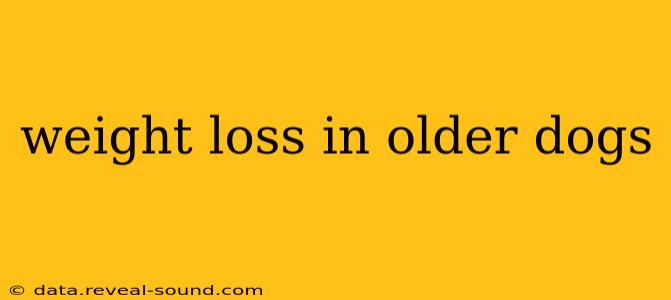Weight management is crucial for dogs of all ages, but it becomes particularly important as they enter their senior years. Older dogs are more susceptible to various health problems exacerbated by excess weight, including arthritis, diabetes, heart disease, and reduced mobility. This comprehensive guide explores the complexities of weight loss in older dogs, offering insights and strategies to help your aging canine companion achieve and maintain a healthy weight.
Why is Weight Loss Important for Older Dogs?
As dogs age, their metabolism slows down, and they require fewer calories. Carrying excess weight puts extra strain on their joints, already potentially weakened by age-related arthritis. This can lead to pain, reduced mobility, and a decreased quality of life. Obesity in older dogs is also linked to an increased risk of developing serious health conditions like diabetes, heart disease, and certain types of cancer. Helping your senior dog lose weight is an act of preventative care, improving their overall health and longevity.
How Do I Know if My Older Dog is Overweight?
Assessing your dog's weight isn't just about stepping on the scale (although that's a good starting point!). You should also consider their body condition score (BCS). A BCS of 5/9 is generally considered ideal; anything higher indicates overweight or obese. Look for these signs:
- Ribs are difficult or impossible to feel: In a healthy dog, you should be able to easily feel their ribs.
- Excess abdominal fat: A noticeable pot belly is a strong indicator of excess weight.
- Lack of waistline: When looking down at your dog from above, you should see a noticeable waist behind the ribs. An absence of this indicates excess weight.
- Difficulty with movement or exercise: If your dog is struggling to walk, climb stairs, or play, it could be a sign of excess weight straining their joints.
What Causes Weight Gain in Older Dogs?
Several factors can contribute to weight gain in older dogs:
- Decreased Activity Levels: Senior dogs naturally become less active, leading to a reduction in calorie expenditure.
- Hormonal Changes: Changes in hormone levels can affect metabolism and appetite.
- Underlying Medical Conditions: Conditions like hypothyroidism can contribute to weight gain.
- Dietary Issues: Overfeeding, inappropriate food choices, or too many treats can easily lead to weight gain.
How Can I Help My Older Dog Lose Weight Safely?
Weight loss in older dogs requires a gradual and careful approach. Sudden or drastic weight loss can be harmful. Here's a multi-faceted approach:
- Veterinary Consultation: Always consult your veterinarian before starting any weight loss program for your dog. They can assess your dog's overall health, rule out underlying medical conditions, and help you create a safe and effective plan.
- Dietary Changes: This is typically the most crucial aspect. Your vet might recommend a prescription diet formulated for weight loss in senior dogs, or they might suggest switching to a lower-calorie, higher-fiber food. Portion control is essential.
- Increased Exercise: While strenuous exercise might not be suitable, gentle, low-impact activities like short walks, swimming, or playtime are crucial. Even small increases in activity can make a significant difference.
- Treat Management: Limit treats and use low-calorie alternatives. Incorporate treats into their daily food allowance.
What Foods Are Good for Weight Loss in Older Dogs?
Your veterinarian can best advise on appropriate foods, but generally, diets higher in fiber and protein and lower in fat are recommended. Look for foods specifically formulated for weight management in senior dogs.
What Are Some Common Mistakes to Avoid When Trying to Help My Older Dog Lose Weight?
- Sudden Dietary Changes: Abrupt changes can upset their digestive system and lead to nutritional deficiencies.
- Over-Exercising: Pushing your senior dog too hard can exacerbate existing joint problems.
- Ignoring Underlying Medical Conditions: Weight gain can be a symptom of an underlying condition; addressing the root cause is crucial.
How Long Does it Take for an Older Dog to Lose Weight?
Weight loss is a gradual process, and it varies depending on the dog's individual circumstances. Be patient and consistent; celebrate small victories along the way.
How Can I Monitor My Older Dog's Progress?
Regularly weigh your dog, monitor their body condition score, and watch for changes in their energy levels and overall health. Discuss your dog's progress with your veterinarian at regular checkups.
By following these guidelines and working closely with your veterinarian, you can help your senior dog achieve and maintain a healthy weight, improving their quality of life and adding years to their life. Remember, patience and consistency are key to success.
